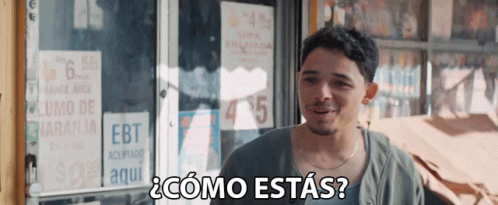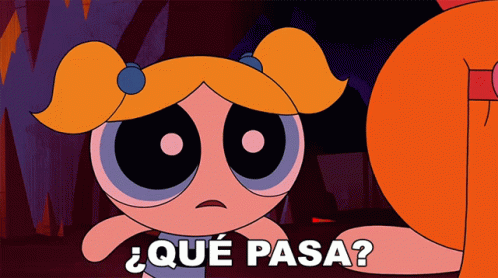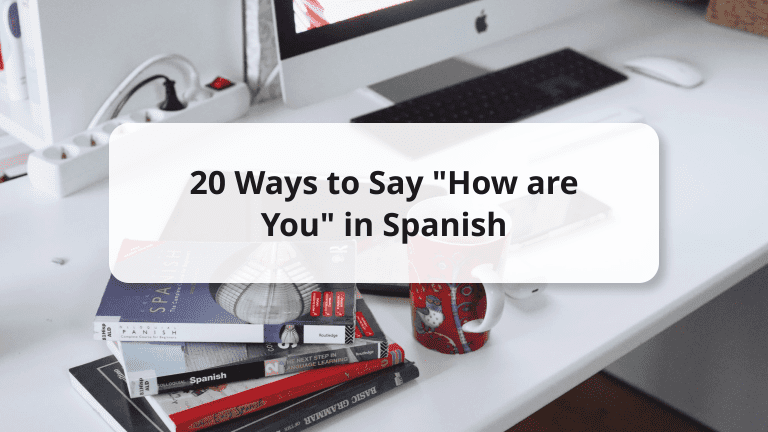Why is learning different ways of saying How are you in Spanish so important? Learning basic key phrases is a good way of starting your journey. Incorporating these concepts into your beginner phrases will help you to assimilate accurate lexicon much quicker and build your repertoire of conversational Spanish.
The most common way to say how are you in Spanish, is ¿cómo estas? Literally meaning “how are you?”. However, there are other ways to ask how are you in Spanish! This article offers you 20 examples of context-sensitive greetings and other hard Spanish words to help you build a conversation. It’s an easy way to start the process of grasping nuances. What’s more, it will also help you to retain your grammar lessons.

20 Detailed Ways to Say “How are You” in Spanish
| Spanish | English | |
| 1 | ¿Cómo estas? | How are you? (informal) |
| 2 | ¿Cómo esta usted? | How are you? (formal) |
| 3 | ¿Cómo van las cosas? | How are things going? (neutral) |
| 4 | ¿Cómo va todo? | How is everything going? (neutral) |
| 5 | ¿Cómo te va? | How’s it going? (informal) |
| 6 | ¿Cómo andas? | How’s it going? (slang) |
| 7 | ¿Cómo te ha ido? | How have you been? (informal) |
| 8 | ¿Qué haces? | What’s up? (slang) |
| 9 | ¿Qué tal? | What’s up? (slang) |
| 10 | ¿Qué onda? | What can you tell me? (informal) |
| 11 | ¿Qué me cuentas? | What can you tell me? (informal) |
| 12 | ¿Qué cuentas? | What’s new? (informal) |
| 13 | ¿Qué hay de nuevo? | What’s new? (very informal) |
| 14 | ¿Qué hay? | What’s new? (very informal) |
| 15 | ¿Qué pasa? | What’s happening? (slang) |
| 16 | ¿Qué hubo? | What’s happening? (slang) |
| 17 | ¿Quiubo? | What’s happening? (slang) |
| 18 | ¿Qué es de tu vida? | What’s going on in your life? (informal) |
| 19 | ¿Cómo te esta tratando la vida? | How is life treating you? (neutral) |
| 20 | ¿Todo bien? | Is everything well? (neutral) |
Simply knowing key greeting phrases isn’t enough. You also need to know what to say when, and what is expected of you when being greeted. If someone asks you ¿Cómo estas? would you know how to say “Good, how are you?” in Spanish? What if someone prefaces ¿Cómo estas? with ¡Buenos días! (good morning)? Would it confuse you?
1. ¿Cómo estas?

How are you? (informal)
This is the most straightforward way you can greet someone in a social setting. You could also ask ¿Cómo estas tú? (”tú” meaning singular “you” in an informal setting). However, because estas has already been conjugated from the word estar (to be) to indicate an informal singular “you,” the sentence will still make sense without the pronoun. (Verb conjugation in Spanish is decided by the number of people you are speaking to and the formality of the setting.)
- Q: ¿Cómo estas? (How are you?)
- A: Estoy bien. (I am well.)
2. ¿Cómo esta usted?
How are you? (Formal)
As above, usted can be omitted and still make sense because the verb already indicates a singular “you” but, because you would use this in a formal setting, including usted would be more appropriate. You would use this when greeting your boss, an elder, or someone you don’t know.
- Q: ¿Cómo esta usted? (How are you?)
- A: Estoy bien, graicias. ¿Y tú? (I am well, thank you. And you?)
3. ¿Comó van las cosas?
How are things going? (Neutral)
This literally means “How go the things?” You can use this in a setting with one or with more people you know. Just as in English, this question is not an invitation to elaborate on matters. The answer would most likely be “fine,” “good,” okay,” and so on.
- Q: ¿Comó van las cosas? (How are things going?)
- A: Las cosas van bien. (Things are going well.)
4. ¿Cómo va todo?
How is everything going? (Neutral)
This literally means “How go the things?” You can use this in a setting with one or with more people you know. Just as in English, asking Spanish question words are not really an invitation to elaborate on matters. The answer would most likely be “fine,” “good,” okay,” and so on.
-
Q: ¿Comó van las cosas? (How are things going?)
-
A: Las cosas van bien. (Things are going well.)
5. ¿Cómo te va?
How’s it going? (Informal)
This one is pretty straightforward. It is an informal way to greet someone, but it’s more informal than cómo estas.
By now you’ve noticed the use of “va” for “going.” Note that va is a conjugation and will change according to the pronoun you use or the tense. (I go = Yo voy; he goes = el va; they go = ellos (male) van; we go = nosotros (male) vamos.)
- Q: ¿Cómo te va? (How’s it going?)
- A: Ma va bien. (It’s going well.)
6. ¿Cómo andas?
How’s it going? (slang)
This one is pretty straightforward. It is an informal way to greet someone, but it’s more informal than cómo estas (how are you in Spanish).
By now you’ve noticed the use of “va” for “going.” Note that va is a conjugation and will change according to the pronoun you use or the tense. (I go = Yo voy; he goes = el va; they go = ellos (male) van; we go = nosotros (male) vamos.)
- Q: ¿Cómo te va? (How’s it going?)
- A: Ma va bien. (It’s going well.)
7. ¿Cómo te ha ido?
How have you been? (Informal)
This is an informal way of asking how someone has been. Formally, it would be more appropriate to use cómo has estado but, in an informal setting, this is colloquially acceptable and makes for more natural speech among acquaintances.
- Q: ¿Comó te ha ido? (How have you been?)
- A: He estado bien. (I’ve been well.)
8. ¿Qué hacés?
What’s up? (Informal)
Where all our previous greetings started with “cómo,” which you would have seen means “how,” you will note here the use of “qué,” meaning “what.”
¿Qué hacés? is an informal way of a greeting friends or people younger than you, and asking how are you in Spanish. It’s literal translation is “What do you do?” In formal situations you would ask ¿A qué te dedicas?, referring to their job, but not when greeting someone.
- Q: ¿Qué hacés? (What’s up?)
- A: No mucho. (Nothing much.)

9. ¿Qué tal?
What’s up? (Slang)
This would be the equivalent of the English “What’s up?” in terms of its informality. However, considering that it literally means “What is your current state?” you wouldn’t answer it with “Not much” or “The sky.” You would rather respond to it as if you are being asked how you are.
- Q: ¿Qué tal hermosa? (What’s up beautiful? How are you?)
- A: Excelente, ¿y tú? (Excellent, and you?)
10. ¿Qué onda?
What’s up? (Slang)
If you find yourself in Latin America, qué onda would be a good way to greet your friends if you are on the younger side. Using this how are you in Spanish, question in formal settings or when greeting older adults would be out of place as it would be like asking someone “How you vibing?”
- Q: ¿Qué onda? (What’s up?)
- A: Todo bien. (All well.)
11. ¿Qué me cuentas?
What can you tell me? (Informal)
The literal meaning is “What do you tell me?”—you are basically asking “What’s new?” Although the word cuentas means “account,” you are not asking for an actual account of their day although it does allow them to go into detail if they so wished.
- Q: ¿Qué me cuentas? (What can you tell me?)
- A: ¡Es mi cumpleaños! (It’s my birthday!)
12. ¿Qué cuentas?
What’s new? (Informal)
¿Qué cuentas? is somewhere between “What’s up?” and “What’s new?” leaving out the singular first-person pronoun. In either case, your answer would be worded the same.
- Q: ¿Qué cuentas? (What’s new?)
- A: Oh, no mucho. (Oh, nothing much.)
13. ¿Qué hay de nuevo?
What’s new? (Very informal)
It’s only appropriate to use this in very informal situations like when talking to friends. It comes down to being asked what’s up that’s new. It does however open the door to a more elaborate answer than when just asking ¿Qué cuentas?
- Q: ¿Qué hay de nuevo? (What’s new?)
- A: Me ascendieron. (I was (got) promoted.)
14. ¿Qué hay?
What’s new? (Very informal)
This is even more informal as it is a shortened version of the above. You’re not actually asking someone what is new—you’re just opening the conversation. It literally means “What is there?” so it would also be appropriate to ask ¿Qué hay? (for lunch).
- Q: ¡Te extraño! ¿Qué hay? (I miss you! What’s new?)
- A: No me quejo. (Can’t complain.)

15. ¿Qué pasa?
What’s happening? (Slang)
Where qué onda would work in Latin America, qué pasa would work in Spain. Outside of an informal context, this would be viewed as you asking what is wrong or what is the matter. Of course, tone also contributes to the meaning.
16. ¿Qué hubo?
What’s happening? (Slang)
This is closer to its English counterpart, literally meaning “What happened?” Here, again, tone and context would dictate the meaning—it would be considered an actual question when not used as a greeting.
- Q: ¿Qué hubo? (What’s happening?)
- A: Todo bien. (Everything’s good.)
17. ¿Quiubo?
What’s happening? (Slang – contraction of “Que hubo)
This is the slangiest of slang. As you can infer, quiubo would be pronounced like qué hubo, but much faster. Think of it as you would say “Howzit” but mean “How is it.”
- Q: ¿Quiubo? (What’s happening?)
- A: ¡Quiubo, mi amigo! (What’s happening, my friend!)
18. ¿Qué es de tu vida?
What’s going on in your life? (Informal)
It makes more sense to think of this as “How’s life?” It’s an informal phrase that invites more information about someone you know and probably haven’t spoken to in a while.
- Q: ¿Qué es de tu vida? (What’s going on in your life?)
- A: Estoy aprendiendo Español. (I’m learning Spanish.)
19. ¿Comó te esta tratando la vida?
How is life treating you? (Neutral)
Although it is used as an opener, it is also the type of question you would ask when you care about a more detailed answer and, for obvious reasons, one you would ask in a formal setting only if it is appropriate.
- Q: ¿Comó te esta tratando la vida? (How is life treating you?)
- A: ¡Estoy embarazada! (I’m pregnant!)

20. ¿Todo bien?
All well? (Neutral)
Just as in French, you can ask a question simply by making a statement and raising your inflection at the end of the sentence. Something like todo bien is both a question and an answer, depending on how you say it.
- Q: ¿Todo bien? (All well?)
- A: Todo bien. (All’s well.)
10 Ways to Answer “How are You” in Spanish
As a beginner, no one would expect you to go into the details of your promotion when asked “How are you?” in Spanish. The most common answers you should know are bien (well) and muy bien (very well). If you want to get fancy, throw in a “Good, how are you?” in Spanish.
Above, you learned:
- Muy bien (Very well)
- Gracias (Thank you)
- ¿Y tú? (And you?)
Now, make your own sentence!
¿Cómo estas?
Muy bien, gracias. ¿Y tú?
One, two, three. You have just pieced together your own sentence. The ball is rolling…
Here are a few other standard responses that will work well for you in the beginning.
| Spanish | English | |
| 1 | Bastante bien | Quiete well |
| 2 | Más o menos | Somewhat okay |
| 3 | Mal | Bad |
| 4 | Igual que siempre | The same as always |
| 5 | Ahí vamos | Hanging in there |
| 6 | De maravilla | Wonderful |
| 7 | Pésimo | Terrible |
| 8 | Estoy muy bien | I’m great |
| 9 | No tan bien | Not so well |
| 10 | Regular | Same as always |

It means “How are you?”. It is an informal question, for formal question, you can ask: ¿Cómo esta usted?
It basically means “How”, like “¿Cómo te va?” is “How’s going?”.
It means “How are you?”, just like ¿Cómo estás?. They mean the same. This is a very common way to say How are you in Spanish.
Muy Bien, Llegaste Hasta Aqui! (Nice Job! You Made it Here!)
You will learn how to say “How are you” in Spanish in no time. How long does it take to learn Spanish? Definitely longer, but with a Spanish tutor you can fast-track your progress. The tutors at AmazingTalker will take into account your native language, your region, and many other factors when coaching you through the process.
Find the perfect tutor for you today and say, Estoy aprendiendo Español! (I’m learning Spanish!)
















